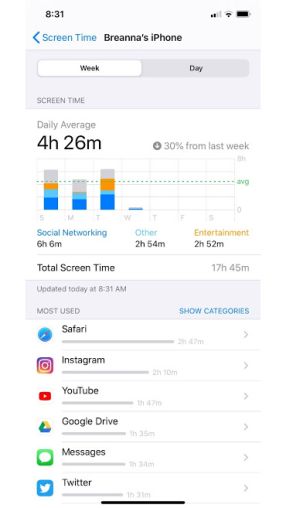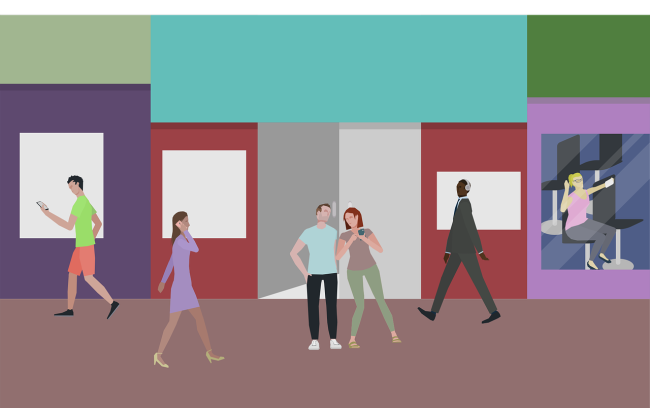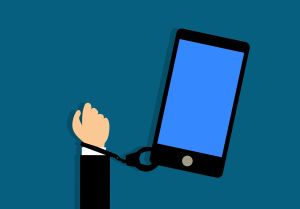“The first thing I do when I wake up is check my phone.”

Breanna Kerr, a sophomore graphic design major at Temple University, starts her day by turning off her phone alarm and checking her phone notifications. She then uses her phone to listen to some music while getting ready for her day and text her friends and family.
An average day for Breanna consists of using her phone in the morning, going on it in the afternoon and during spare time in between classes and right before she goes to bed. She explained that she primarily uses her phone to text friends and family, listen to music, go on social media, and do research online.
After tracking her phone usage, she found that she spends about four hours on her phone per day and around 18-20 hours overall per week.
Breanna’s story is not unusual, as it is something that many people in today’s generation can relate to. With technology continuing to advance everyday, phones have become an important resource in daily life.
ZDNet explains that the average person goes on their phone for about 5.4 hours a day while a study by Asurion reported that the average American checks their phone about 80 times in a day.
According to a Pew Research Center Survey, an estimated 81 percent of Americans claim to use their phones daily, while 45 percent said that they go on their phone multiple times a day. According to the survey, only 9 percent of people claimed that they only check their phone one time per day, with less than eight percent claiming that they use their phone nonroutinely and 10 percent claiming they do not use their phone or other devices.
Many studies have been done over the years on screen time, but the effects a phone has on a person are still relatively new with research on this matter happening right now. These mobile devices are very useful tools that help with everyday situations and supply a way to communicate through call or text and they are essentially a portable computer providing access to unlimited amounts of information that can be accessed anywhere at any given moment.
Although there are many positives to having a phone, concerns have risen within the last couple of years about what the possible repercussions of too much phone exposure could have on a person. With phones practically being rooted into a person’s daily regime, it raises questions about where the line is drawn for overexposure to these devices.
Dr. Kimlee Fogelson-Turet, a professor in the psychology department at Cabrini University who teaches a class on technology and human development, explained that there is a lot of research coming out [on the effects of cell phone addiction] right now and that is it being looked at in studies.
“We kind of got off using cell phones without really knowing what the impact was,” Turet said. “We just thought they were these really cool things and we could kind of just keep using them, so it turns out that there may be some addictive pieces and it comes from different angles.”
She went on to explain that the goals of tech companies are to keep people “focused on their phone for as long as possible.” She also added that when you sign onto Facebook that you are not Facebook’s customer, the ad companies are facebook’s customer and they are just after your attention.
“They set it up using all types of algorithms to keep our attention,” she added.
In Breanna’s case, she believes that the cause for her phone usage is due to conditioning and is a result of boredom.
“I wouldn’t say that I’m addicted,” Kerr said. “I think it’s more like it keeps me doing something so I’m never just sitting there. If I’m not doing something with someone else then I’m on my phone,” Kerr added.
Kerr explained that phones are very convenient as a way “to keep your mind busy for a few hours”, but that it can also be a bad thing because it can prevent her from being social and information can get lost sometimes.
She also noted the irony about the purpose of a phone being to connect but how it has prevented some connections as well.
“There’s an incredible irony here,” Turet said. “We hang on to our phones so that we feel connected with other people but when we’re right in the moment with other people we’re looking at our phones and not connecting with other people.”
“We’re missing the real thing in favor of this illusion even when we’re right in the moment,” she added.

How phones affect mental health and cognitive development
According to Turet, there are many long-term and short-term effects on brain growth and social impacts associated with cell phone and other technological uses. While phones are great resources and create opportunities to connect with people in new ways, there are also downsides to these tools when they are overused.
“We see people who use their cell phones excessively and technology in general with high rates of depression and anxiety,” she said.
“In that process though, there is the potential to lose some skill development,” Turet added. “We get better and better at social skills by practicing them, so if we aren’t practicing them because we are engaging through this alternative method then we are not getting comfortable with how to make eye contact or how to communicate in person, so that may even keep us turning toward our phone.”
According to HelpGuide, too much phone and internet usage has been linked to loneliness and depression, as well as increased anxiety and stress. It also affects the ability to sleep, which can lead to mental health issues and memory problems, as well as decreased attention span and reduced ability to think creatively and concentrate, among other things.
Turet also mentioned the impact of phone notifications and how they can cause anxiety and a certain level of urgency. She gave an example that a notification should not carry the same weight of importance compared to if a bomb were to go off in a building.
“When my phone dings I want to know what it is,” Kerr said.
Kerr also spoke about how her phone can distract her sometimes and that she is able to see her notification on her apple watch even when her phone is not around.
After looking at a notification it can be difficult to return back to the previous task at-hand which is why phones can be a big distraction.
While there are downsides that need to be addressed, Turet does believe that it is all about finding a healthy balance in moderation since technology has been integrated into society and technology offers many benefits as well.
Turet also explained that the chemical dopamine has a vital role as to why people check their phones so frequently due to the pleasure and excitement it causes. Every time someone uses their phone they get a “dopamine hit” which over time has become associated with checking phones through “operant conditioning reinforcement” and an “intermittent reward system.”
“…We respond to things that matter to us and that make us feel good, and we get a dopamine hit every time that happens,” Turet said. “That chemical in our brain is very powerful and we want more of that.”

Evolution of technology and social media influence
A recent study from 2019 conducted by the Pew Research Center claims that 96 percent of Americans own some type a phone with 81 percent owning a smartphone which is a major increase from their first survey results back in 2011 which at the time had an average of only 35 percent of Americans that owned smartphones.
According to Dr. Nune Grigoryan, a communication professor who teaches a class called Social Media Engagement at Cabrini University, believes that social media “amplifies that feeling of connectedness to your phone.”
“Because of this, you are immediately using your phone, but because you are on social media it seems like you are interacting with other people so you don’t even notice the technology that you are using,” she said.
Along with many people in today’s generation, Breanna uses her smartphone for the purpose of social media. One of her most frequently used social media apps is Instagram.
As a result of these features offered on her phone, Breanna has lost some time and sleep because she ended up being on her phone longer than she had originally planned. This often happens on social media because it is so easy to get lost in endless scrolling with new information coming in constantly.
According to ZDNet, social media occupies most smartphone screen time as Americans typically spend an average of 64.5 minutes a day on Facebook and 48 minutes on Instagram.
Both Turet and Grigoryan agree that the purpose of the phone has changed greatly with these new developments that have expanded from just being able to make a call or send a text.
“I don’t even really use my phone to text anymore since there are apps like Instagram to text on,” Kerr said.
A study by Asurion found that seven out of 10 people keep their phones by their bed when they sleep and that 23 percent of people have brought their phone with them to the bathroom because they did not want to miss anything.
Call to action
After reading this article, challenge yourself to track your phone usage, challenge yourself to turn off every notification and challenge yourself to become more mindful and to possibly disconnect for a day…. can you do it?


